Analyzing the Effect of Mental Illness on Gun Violence: A Report
VerifiedAdded on 2023/05/30
|8
|1458
|55
Report
AI Summary
This report investigates the complex relationship between mental illness and gun violence, particularly in the United States. It begins with an introductory statement highlighting the persistent social problem of gun violence and the increasing number of deaths and healthcare costs associated with it. The thesis argues that increased gun ownership, especially by stigmatized individuals or those with mental illnesses, contributes to high levels of violence. The report is structured around four main ideas: the association of firearms with mental illness stigma, the link between people with psychiatric disorders and violent behavior, the historical association of forced psychiatric interventions with violence, and the predictive role of mental illness in gun violence. Evidence is provided to support each claim, including the stigmatization of gun collectives, the increased likelihood of violence among those with mental illnesses, the impact of forced treatments, and the role of mental illness in mass shootings. The conclusion restates the argument and emphasizes the need to address gun violence, particularly by limiting gun ownership among the mentally ill. The report cites several sources, including research on gun events, psychiatric disorders, and the politics of American firearms.
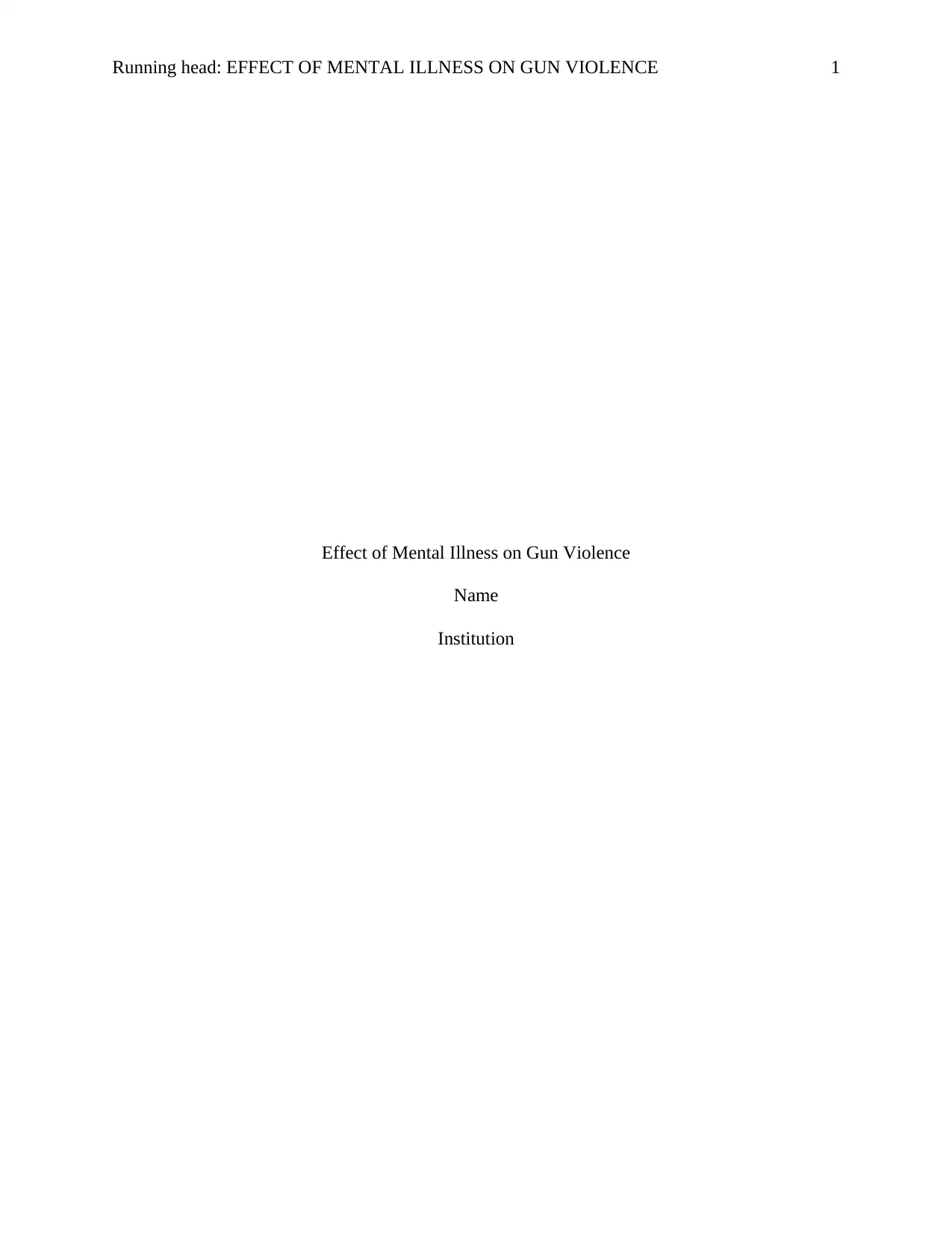
Running head: EFFECT OF MENTAL ILLNESS ON GUN VIOLENCE 1
Effect of Mental Illness on Gun Violence
Name
Institution
Effect of Mental Illness on Gun Violence
Name
Institution
Paraphrase This Document
Need a fresh take? Get an instant paraphrase of this document with our AI Paraphraser
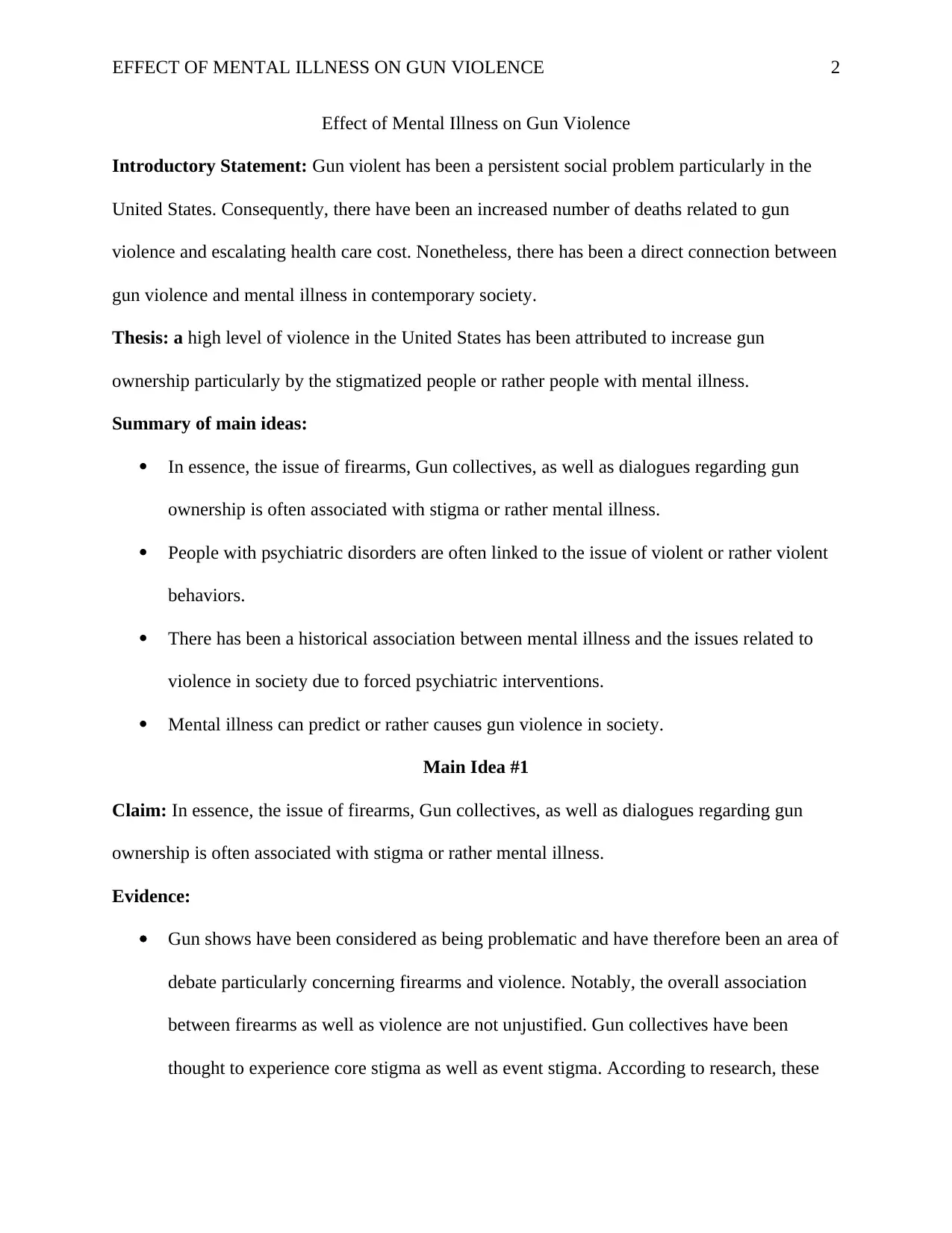
EFFECT OF MENTAL ILLNESS ON GUN VIOLENCE 2
Effect of Mental Illness on Gun Violence
Introductory Statement: Gun violent has been a persistent social problem particularly in the
United States. Consequently, there have been an increased number of deaths related to gun
violence and escalating health care cost. Nonetheless, there has been a direct connection between
gun violence and mental illness in contemporary society.
Thesis: a high level of violence in the United States has been attributed to increase gun
ownership particularly by the stigmatized people or rather people with mental illness.
Summary of main ideas:
In essence, the issue of firearms, Gun collectives, as well as dialogues regarding gun
ownership is often associated with stigma or rather mental illness.
People with psychiatric disorders are often linked to the issue of violent or rather violent
behaviors.
There has been a historical association between mental illness and the issues related to
violence in society due to forced psychiatric interventions.
Mental illness can predict or rather causes gun violence in society.
Main Idea #1
Claim: In essence, the issue of firearms, Gun collectives, as well as dialogues regarding gun
ownership is often associated with stigma or rather mental illness.
Evidence:
Gun shows have been considered as being problematic and have therefore been an area of
debate particularly concerning firearms and violence. Notably, the overall association
between firearms as well as violence are not unjustified. Gun collectives have been
thought to experience core stigma as well as event stigma. According to research, these
Effect of Mental Illness on Gun Violence
Introductory Statement: Gun violent has been a persistent social problem particularly in the
United States. Consequently, there have been an increased number of deaths related to gun
violence and escalating health care cost. Nonetheless, there has been a direct connection between
gun violence and mental illness in contemporary society.
Thesis: a high level of violence in the United States has been attributed to increase gun
ownership particularly by the stigmatized people or rather people with mental illness.
Summary of main ideas:
In essence, the issue of firearms, Gun collectives, as well as dialogues regarding gun
ownership is often associated with stigma or rather mental illness.
People with psychiatric disorders are often linked to the issue of violent or rather violent
behaviors.
There has been a historical association between mental illness and the issues related to
violence in society due to forced psychiatric interventions.
Mental illness can predict or rather causes gun violence in society.
Main Idea #1
Claim: In essence, the issue of firearms, Gun collectives, as well as dialogues regarding gun
ownership is often associated with stigma or rather mental illness.
Evidence:
Gun shows have been considered as being problematic and have therefore been an area of
debate particularly concerning firearms and violence. Notably, the overall association
between firearms as well as violence are not unjustified. Gun collectives have been
thought to experience core stigma as well as event stigma. According to research, these
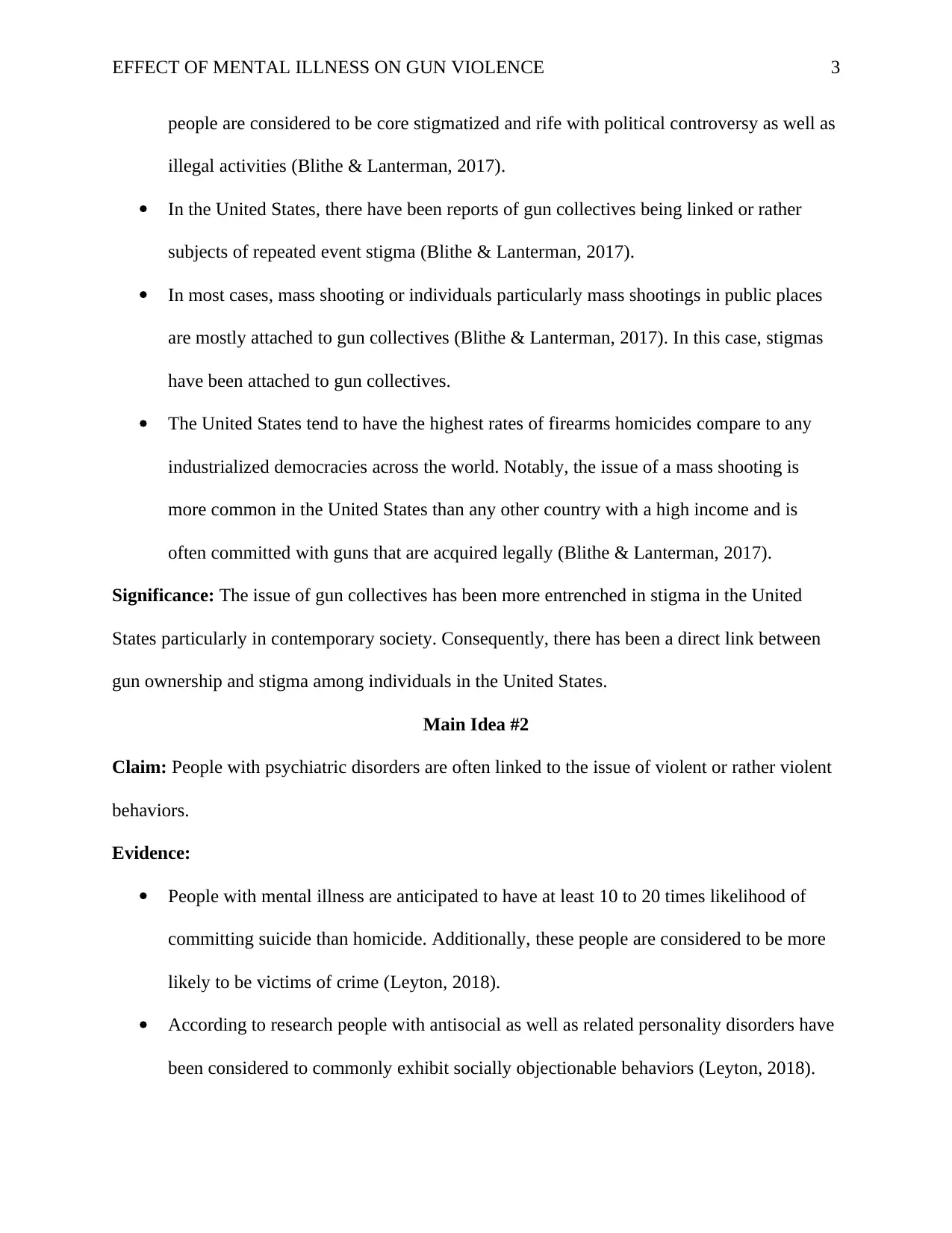
EFFECT OF MENTAL ILLNESS ON GUN VIOLENCE 3
people are considered to be core stigmatized and rife with political controversy as well as
illegal activities (Blithe & Lanterman, 2017).
In the United States, there have been reports of gun collectives being linked or rather
subjects of repeated event stigma (Blithe & Lanterman, 2017).
In most cases, mass shooting or individuals particularly mass shootings in public places
are mostly attached to gun collectives (Blithe & Lanterman, 2017). In this case, stigmas
have been attached to gun collectives.
The United States tend to have the highest rates of firearms homicides compare to any
industrialized democracies across the world. Notably, the issue of a mass shooting is
more common in the United States than any other country with a high income and is
often committed with guns that are acquired legally (Blithe & Lanterman, 2017).
Significance: The issue of gun collectives has been more entrenched in stigma in the United
States particularly in contemporary society. Consequently, there has been a direct link between
gun ownership and stigma among individuals in the United States.
Main Idea #2
Claim: People with psychiatric disorders are often linked to the issue of violent or rather violent
behaviors.
Evidence:
People with mental illness are anticipated to have at least 10 to 20 times likelihood of
committing suicide than homicide. Additionally, these people are considered to be more
likely to be victims of crime (Leyton, 2018).
According to research people with antisocial as well as related personality disorders have
been considered to commonly exhibit socially objectionable behaviors (Leyton, 2018).
people are considered to be core stigmatized and rife with political controversy as well as
illegal activities (Blithe & Lanterman, 2017).
In the United States, there have been reports of gun collectives being linked or rather
subjects of repeated event stigma (Blithe & Lanterman, 2017).
In most cases, mass shooting or individuals particularly mass shootings in public places
are mostly attached to gun collectives (Blithe & Lanterman, 2017). In this case, stigmas
have been attached to gun collectives.
The United States tend to have the highest rates of firearms homicides compare to any
industrialized democracies across the world. Notably, the issue of a mass shooting is
more common in the United States than any other country with a high income and is
often committed with guns that are acquired legally (Blithe & Lanterman, 2017).
Significance: The issue of gun collectives has been more entrenched in stigma in the United
States particularly in contemporary society. Consequently, there has been a direct link between
gun ownership and stigma among individuals in the United States.
Main Idea #2
Claim: People with psychiatric disorders are often linked to the issue of violent or rather violent
behaviors.
Evidence:
People with mental illness are anticipated to have at least 10 to 20 times likelihood of
committing suicide than homicide. Additionally, these people are considered to be more
likely to be victims of crime (Leyton, 2018).
According to research people with antisocial as well as related personality disorders have
been considered to commonly exhibit socially objectionable behaviors (Leyton, 2018).
⊘ This is a preview!⊘
Do you want full access?
Subscribe today to unlock all pages.

Trusted by 1+ million students worldwide
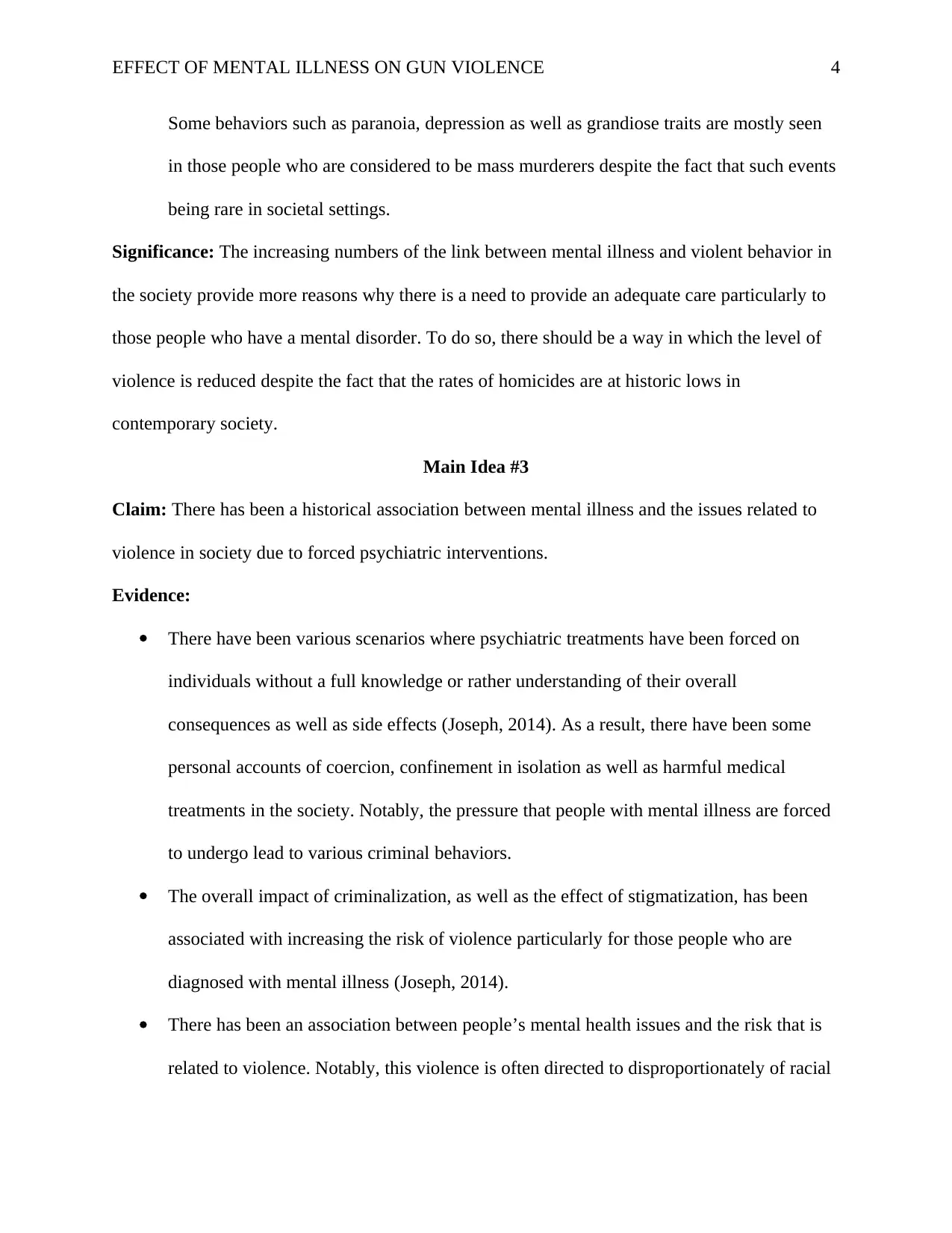
EFFECT OF MENTAL ILLNESS ON GUN VIOLENCE 4
Some behaviors such as paranoia, depression as well as grandiose traits are mostly seen
in those people who are considered to be mass murderers despite the fact that such events
being rare in societal settings.
Significance: The increasing numbers of the link between mental illness and violent behavior in
the society provide more reasons why there is a need to provide an adequate care particularly to
those people who have a mental disorder. To do so, there should be a way in which the level of
violence is reduced despite the fact that the rates of homicides are at historic lows in
contemporary society.
Main Idea #3
Claim: There has been a historical association between mental illness and the issues related to
violence in society due to forced psychiatric interventions.
Evidence:
There have been various scenarios where psychiatric treatments have been forced on
individuals without a full knowledge or rather understanding of their overall
consequences as well as side effects (Joseph, 2014). As a result, there have been some
personal accounts of coercion, confinement in isolation as well as harmful medical
treatments in the society. Notably, the pressure that people with mental illness are forced
to undergo lead to various criminal behaviors.
The overall impact of criminalization, as well as the effect of stigmatization, has been
associated with increasing the risk of violence particularly for those people who are
diagnosed with mental illness (Joseph, 2014).
There has been an association between people’s mental health issues and the risk that is
related to violence. Notably, this violence is often directed to disproportionately of racial
Some behaviors such as paranoia, depression as well as grandiose traits are mostly seen
in those people who are considered to be mass murderers despite the fact that such events
being rare in societal settings.
Significance: The increasing numbers of the link between mental illness and violent behavior in
the society provide more reasons why there is a need to provide an adequate care particularly to
those people who have a mental disorder. To do so, there should be a way in which the level of
violence is reduced despite the fact that the rates of homicides are at historic lows in
contemporary society.
Main Idea #3
Claim: There has been a historical association between mental illness and the issues related to
violence in society due to forced psychiatric interventions.
Evidence:
There have been various scenarios where psychiatric treatments have been forced on
individuals without a full knowledge or rather understanding of their overall
consequences as well as side effects (Joseph, 2014). As a result, there have been some
personal accounts of coercion, confinement in isolation as well as harmful medical
treatments in the society. Notably, the pressure that people with mental illness are forced
to undergo lead to various criminal behaviors.
The overall impact of criminalization, as well as the effect of stigmatization, has been
associated with increasing the risk of violence particularly for those people who are
diagnosed with mental illness (Joseph, 2014).
There has been an association between people’s mental health issues and the risk that is
related to violence. Notably, this violence is often directed to disproportionately of racial
Paraphrase This Document
Need a fresh take? Get an instant paraphrase of this document with our AI Paraphraser
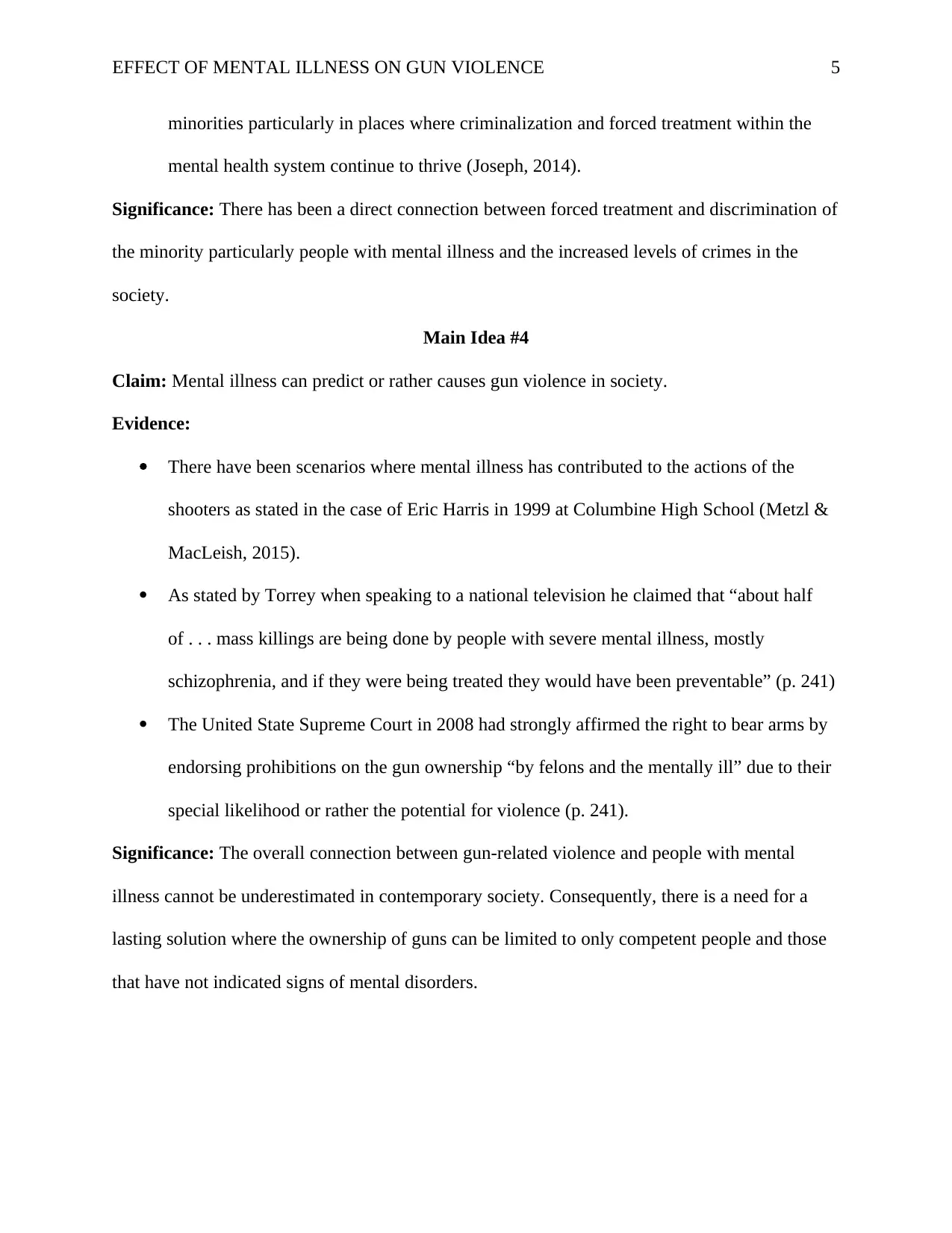
EFFECT OF MENTAL ILLNESS ON GUN VIOLENCE 5
minorities particularly in places where criminalization and forced treatment within the
mental health system continue to thrive (Joseph, 2014).
Significance: There has been a direct connection between forced treatment and discrimination of
the minority particularly people with mental illness and the increased levels of crimes in the
society.
Main Idea #4
Claim: Mental illness can predict or rather causes gun violence in society.
Evidence:
There have been scenarios where mental illness has contributed to the actions of the
shooters as stated in the case of Eric Harris in 1999 at Columbine High School (Metzl &
MacLeish, 2015).
As stated by Torrey when speaking to a national television he claimed that “about half
of . . . mass killings are being done by people with severe mental illness, mostly
schizophrenia, and if they were being treated they would have been preventable” (p. 241)
The United State Supreme Court in 2008 had strongly affirmed the right to bear arms by
endorsing prohibitions on the gun ownership “by felons and the mentally ill” due to their
special likelihood or rather the potential for violence (p. 241).
Significance: The overall connection between gun-related violence and people with mental
illness cannot be underestimated in contemporary society. Consequently, there is a need for a
lasting solution where the ownership of guns can be limited to only competent people and those
that have not indicated signs of mental disorders.
minorities particularly in places where criminalization and forced treatment within the
mental health system continue to thrive (Joseph, 2014).
Significance: There has been a direct connection between forced treatment and discrimination of
the minority particularly people with mental illness and the increased levels of crimes in the
society.
Main Idea #4
Claim: Mental illness can predict or rather causes gun violence in society.
Evidence:
There have been scenarios where mental illness has contributed to the actions of the
shooters as stated in the case of Eric Harris in 1999 at Columbine High School (Metzl &
MacLeish, 2015).
As stated by Torrey when speaking to a national television he claimed that “about half
of . . . mass killings are being done by people with severe mental illness, mostly
schizophrenia, and if they were being treated they would have been preventable” (p. 241)
The United State Supreme Court in 2008 had strongly affirmed the right to bear arms by
endorsing prohibitions on the gun ownership “by felons and the mentally ill” due to their
special likelihood or rather the potential for violence (p. 241).
Significance: The overall connection between gun-related violence and people with mental
illness cannot be underestimated in contemporary society. Consequently, there is a need for a
lasting solution where the ownership of guns can be limited to only competent people and those
that have not indicated signs of mental disorders.
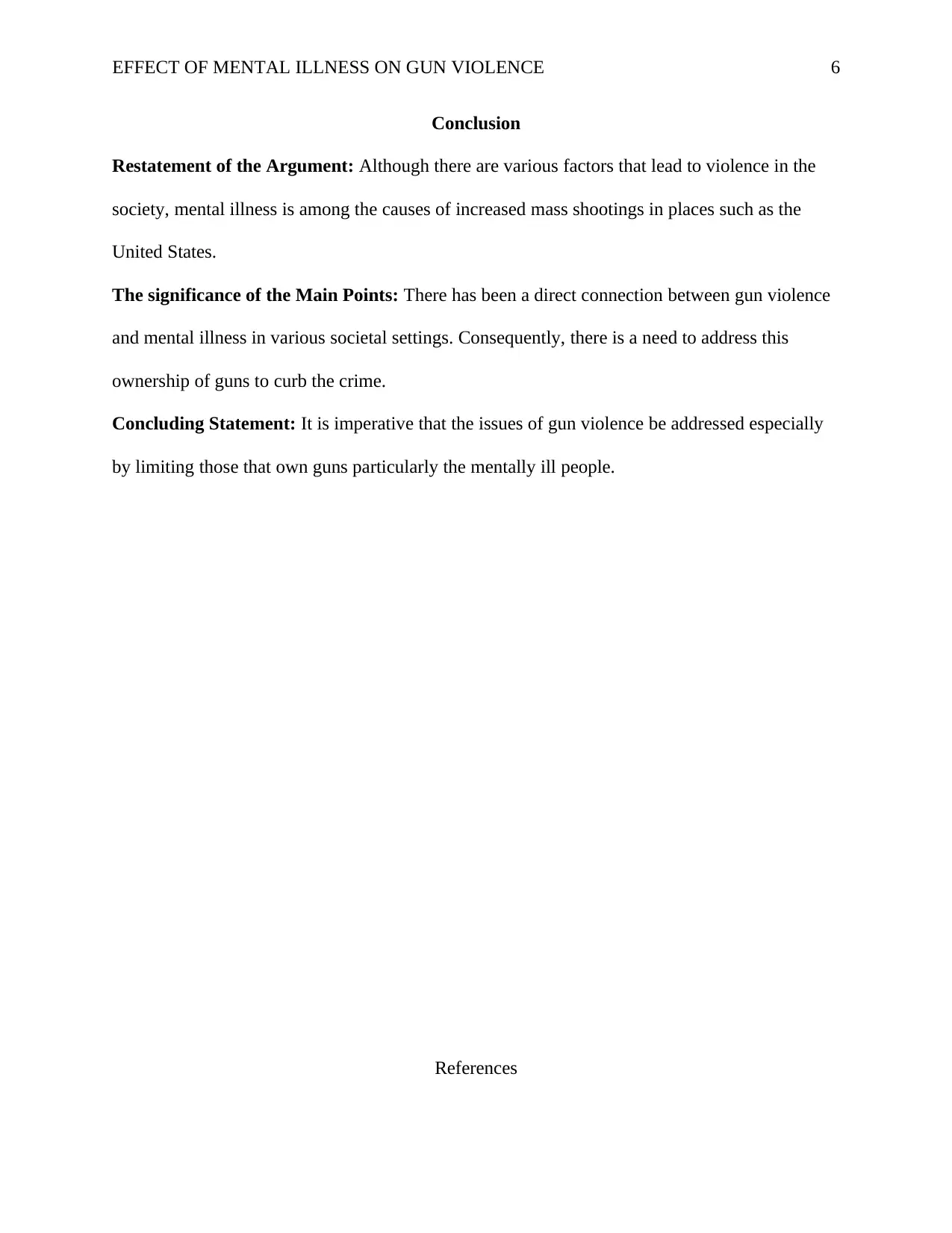
EFFECT OF MENTAL ILLNESS ON GUN VIOLENCE 6
Conclusion
Restatement of the Argument: Although there are various factors that lead to violence in the
society, mental illness is among the causes of increased mass shootings in places such as the
United States.
The significance of the Main Points: There has been a direct connection between gun violence
and mental illness in various societal settings. Consequently, there is a need to address this
ownership of guns to curb the crime.
Concluding Statement: It is imperative that the issues of gun violence be addressed especially
by limiting those that own guns particularly the mentally ill people.
References
Conclusion
Restatement of the Argument: Although there are various factors that lead to violence in the
society, mental illness is among the causes of increased mass shootings in places such as the
United States.
The significance of the Main Points: There has been a direct connection between gun violence
and mental illness in various societal settings. Consequently, there is a need to address this
ownership of guns to curb the crime.
Concluding Statement: It is imperative that the issues of gun violence be addressed especially
by limiting those that own guns particularly the mentally ill people.
References
⊘ This is a preview!⊘
Do you want full access?
Subscribe today to unlock all pages.

Trusted by 1+ million students worldwide
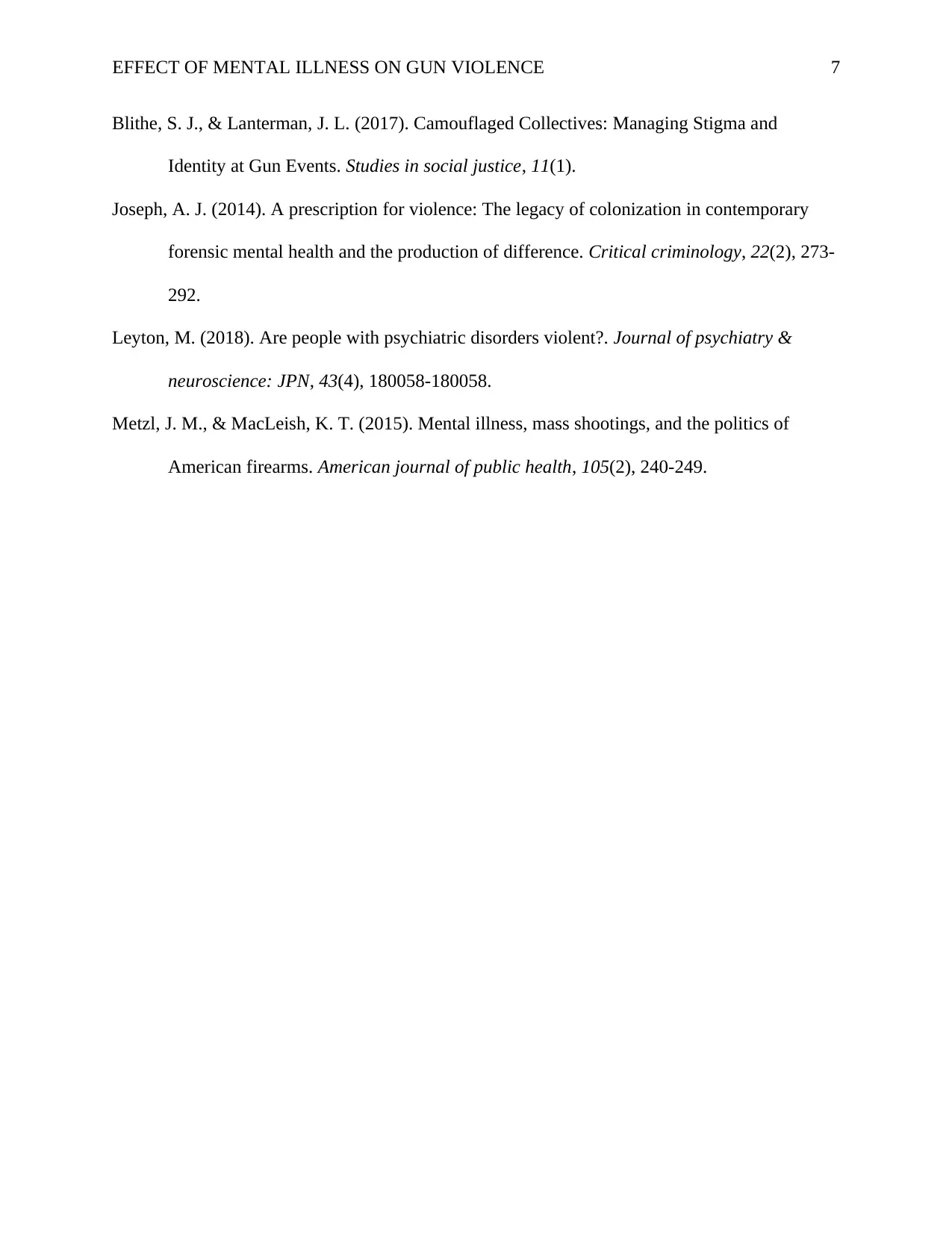
EFFECT OF MENTAL ILLNESS ON GUN VIOLENCE 7
Blithe, S. J., & Lanterman, J. L. (2017). Camouflaged Collectives: Managing Stigma and
Identity at Gun Events. Studies in social justice, 11(1).
Joseph, A. J. (2014). A prescription for violence: The legacy of colonization in contemporary
forensic mental health and the production of difference. Critical criminology, 22(2), 273-
292.
Leyton, M. (2018). Are people with psychiatric disorders violent?. Journal of psychiatry &
neuroscience: JPN, 43(4), 180058-180058.
Metzl, J. M., & MacLeish, K. T. (2015). Mental illness, mass shootings, and the politics of
American firearms. American journal of public health, 105(2), 240-249.
Blithe, S. J., & Lanterman, J. L. (2017). Camouflaged Collectives: Managing Stigma and
Identity at Gun Events. Studies in social justice, 11(1).
Joseph, A. J. (2014). A prescription for violence: The legacy of colonization in contemporary
forensic mental health and the production of difference. Critical criminology, 22(2), 273-
292.
Leyton, M. (2018). Are people with psychiatric disorders violent?. Journal of psychiatry &
neuroscience: JPN, 43(4), 180058-180058.
Metzl, J. M., & MacLeish, K. T. (2015). Mental illness, mass shootings, and the politics of
American firearms. American journal of public health, 105(2), 240-249.
Paraphrase This Document
Need a fresh take? Get an instant paraphrase of this document with our AI Paraphraser

EFFECT OF MENTAL ILLNESS ON GUN VIOLENCE 8
1 out of 8
Related Documents
Your All-in-One AI-Powered Toolkit for Academic Success.
+13062052269
info@desklib.com
Available 24*7 on WhatsApp / Email
![[object Object]](/_next/static/media/star-bottom.7253800d.svg)
Unlock your academic potential
Copyright © 2020–2026 A2Z Services. All Rights Reserved. Developed and managed by ZUCOL.





